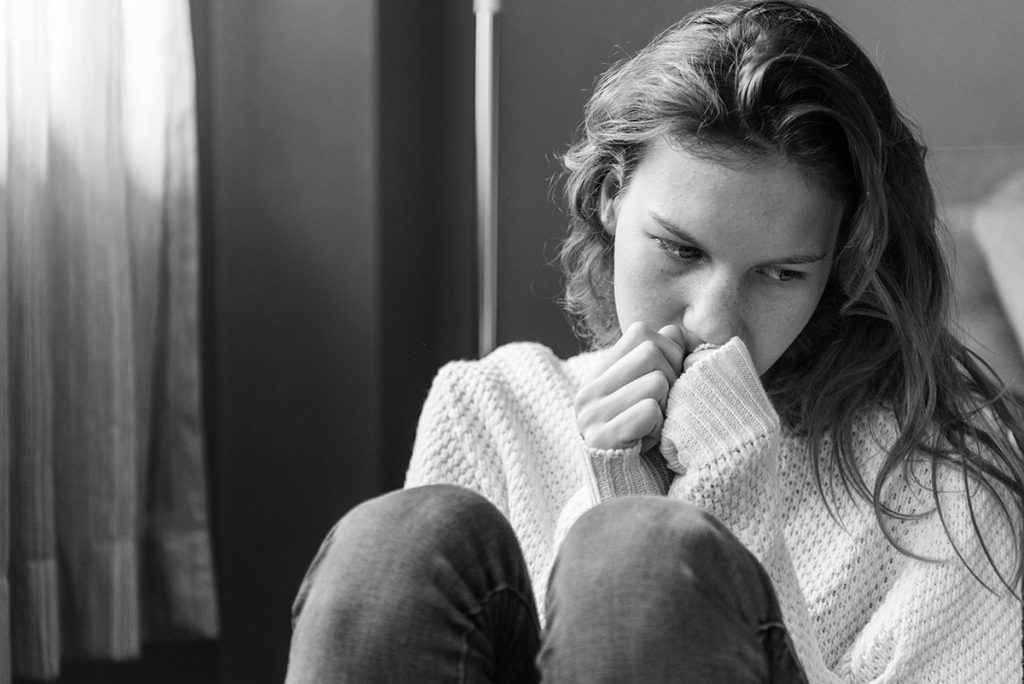When you have pulled yourself out of depression, it is natural to worry that it could return, especially when the signs start to look familiar. A few low days turn into weeks. You lose interest in things you normally love. And then a quiet thought slips in “Am I falling into depression again?”.
That worry is valid, but it does not mean you are doomed to repeat the past. Many people recover and go on to maintain long stretches of stability.
However, research also shows that around half of people who have had one major depressive episode experience another in their lifetime.
The good news is that if you spot the early signs of slipping into depression, you stand a better chance of preventing a full-blown episode or at least managing symptoms more effectively if they reappear.
In this article, we will explain why a depression relapse may occur, the signs to look out for, and what kind of support is needed to recover and stay well.
What is a Depression Relapse and Why Does It Happen?
Once you have experienced a depressive episode, it can return in one of two forms: relapse or recurrence.
A relapse is when symptoms reappear shortly after recovery, usually within two months of ending treatment for the initial episode.
A recurrence refers to depression that returns after a longer stretch of stability, sometimes months or even years later. According to the American Psychiatric Association, most recurrences occur within the first six months after treatment ends.
Research also shows that the risk of depression returning rises with each episode a person experiences.
About 50% of people who have had one major depressive episode will have another at some point in their lives. The risk rises to around 70% after a second episode and up to 90% after a third.
While depression can return for many reasons, some situations or health factors appear to increase the chance of relapse or recurrence. These include:
- Stressful life events such as the death of a loved one, a relationship breakdown, or ongoing family conflict.
- Medical conditions like obesity, diabetes, or other chronic illnesses that can affect mood and energy.
- Ending treatment too early, whether by stopping medication or therapy before full recovery.
- Receiving ineffective treatment, where the underlying causes or triggers aren’t fully addressed.
Those numbers can feel discouraging, like recovery is always temporary. But they do not mean you are destined to fall back into depression. When you know potential triggers, you can spot the early signs and seek the right support before a full episode develops.
Is My Depression Coming Back? 10 Warning Signs
When the fatigue, lack of motivation, or emotional heaviness you thought you had left behind start to return, it can be hard to tell whether it is just a rough patch or a sign of depression. Many people in this moment quietly say to themselves: “I think I’m depressed again.”
While only a qualified mental-health professional can make a diagnosis, there are certain signs that may suggest you’re slipping back into depression and that it’s time to reach out for support.
These include:
- Change in appetite: Eating much less than usual or losing interest in food altogether, or the opposite; turning to food for comfort and overeating.
- Persistent sadness: Feeling empty, hopeless, or unusually tearful most days, even when nothing specific has happened.
- Loss of motivation: No longer feeling drawn to hobbies or activities you usually enjoy, or finding they don’t bring the same sense of pleasure.
- Tiredness and low energy: Everyday tasks start feeling heavier, take longer, or leave you drained even after resting.
- Restlessness or agitation: Feeling keyed-up, anxious, unable to sit still, or pacing without knowing why.
- Changes in sleep: Struggling to fall asleep or stay asleep, waking too early, or sleeping far more than usual but still feeling tired.
- Unexplained aches and pains: Headaches, stomachaches, or muscle pain that don’t have a clear medical cause and seem tied to your mood.
- Dwelling on past events: Getting stuck on feelings of guilt, shame, or worthlessness over things you’ve done or things that happened long ago.
- Irritability: Snapping at people more easily, feeling on edge, or becoming frustrated over small things that normally wouldn’t bother you.
- Thoughts of self-harm or suicide: Feeling so hopeless that life doesn’t seem worth living, or thinking about harming yourself. This is a medical emergency. If you’re having these thoughts, reach out for help immediately.
Having one or two of these signs does not always mean depression is back, but if you are experiencing multiple at the same time and they start interfering with your daily life, it is a good time to reach out to your therapist or a treatment centre like The Dawn and discuss what you are noticing.
How to Prevent a Depression Relapse
Relapse is not inevitable. With the right habits, support, and treatment plan, you can reduce your risk of falling into depression again and feel more in control of your mental health.
Here are some practical steps to help you maintain long-term stability:
- Commit to treatment: If you have been prescribed antidepressants, take the full course exactly as directed and check in regularly with your doctor. It is common to want to stop once you start feeling better, but doing so too soon can raise the chance of relapse. If your treatment includes therapy, keep attending sessions until your psychologist agrees it is time to pause or end.
- Practice mindfulness: Mindfulness meditation a few times a week can cut relapse risk by up to 50% within a year. You do not have to spend hours crossed-legged on the floor to achieve this. Simply take a few moments each day to slow down and notice your thoughts without judgment, instead of getting pulled into the past or future.
- Accept support: Depression often clouds self-awareness, making it harder to notice warning signs in yourself. Trusted friends and family can help spot changes in your mood or behaviour before you do. Opening up to them can make it easier to seek help early and avoid slipping back into depression.
Create a plan: Work with your therapist to outline what steps to take if symptoms start to resurface. Write down what early signs to watch for, who to contact, and what helps you most when you are struggling. Having a clear plan in place can make you feel more prepared and empowered to manage difficult times.
Treatment Options If You Are Slipping Back Into Depression
If you notice old patterns returning, do not lose heart. Depression can be treated, even after recurrence or relapse.
The following approaches, recommended by the National Alliance on Mental Illness, can help manage symptoms and reduce the risk of future relapse:
- Therapy: Both Cognitive Behavioural Therapy (CBT) and Mindfulness-Based Cognitive Therapy (MBCT) have been shown to support recovery and lower the risk of relapse. These talk therapies help you recognise unhelpful thought patterns, develop healthy coping skills, and change behaviours that can maintain depression. In rehab programmes for depression, these therapies are often part of daily treatment.
- Exercise: Regular movement releases endorphins, the body’s natural “feel-good” chemicals. Even low- to moderate-intensity exercise can improve mood and brain function, making it easier to manage symptoms.
- Medication: Antidepressants are often an essential part of treatment. Continuing them for at least six months after recovery can also significantly lower the risk of relapse. Always consult your doctor before starting, adjusting, or discontinuing medication to ensure safe and effective care.
Different approaches work for different people, and sometimes a combination of treatments offers the best results. That is why it is important to work with a qualified professional to find the plan that fits your needs and supports lasting recovery.
Getting the Right Support: Depression Rehab in Thailand
When depression has returned before, it is easy to fear it always will and that recovery is only fleeting before another episode hits.
Sometimes, what helps most is not staying in familiar environments that carry old stressors and triggers. It is stepping into a setting designed for healing, where you can pause daily demands and focus fully on recovery.
That is where inpatient treatment can make a difference. It offers round-the-clock care, a predictable routine, and the space to focus on healing without the pressures of daily life, giving you the time and structure needed to regain stability and prevent another downward spiral.
Many people choose to begin this process abroad, where the change in surroundings creates the distance needed to reflect, reset, and see recovery as a fresh start rather than a repeat of the past.
When weighing options, many people find that The Dawn Rehab in Thailand offers the right balance of professional care and restorative surroundings.
Our Western-trained clinical team treats both situational and clinical depression, tailoring each programme to meet your unique needs.
As Asia’s only CARF-accredited centre, we meet internationally recognised standards for evidence-based treatment, safety, and ethical care, giving you complete confidence that you’re in trusted hands throughout your recovery.
Here’s what you can expect from our depression treatment programme at The Dawn:
A Multi-Faceted Treatment Approach
We create personalised treatment plans that combine proven Western therapies with restorative Eastern wellness practices.
Our clinical team uses Eye Movement Desensitisation and Reprocessing (EMDR) and Cognitive Behavioural Therapy (CBT) to help you address the root causes of depression, while daily meditation, sound baths, yoga, and exercise support your mental clarity and emotional balance.
Our onsite medical team also monitors progress closely and adjusts medication as needed to ensure your treatment remains safe and effective.
An Alternative for Those Who Are Medication-Resistant
For individuals who have not responded well to traditional medication, we offer Transcranial Magnetic Stimulation (TMS), an FDA-approved, non-invasive treatment proven to help relieve symptoms of depression.
TMS gently stimulates targeted areas of the brain involved in mood regulation, offering hope and relief for those seeking an alternative path to recovery.
A Place to Refocus on Yourself
Set along a peaceful river and surrounded by rice fields and traditional Thai villages, our centre offers a calm, private space away from familiar routines and constant demands.
Here, you can slow down, step back from triggers, and reconnect with yourself in an environment built to support lasting recovery.
If you feel you may be slipping back into depression, reach out to us anytime. We’re here to help you find your footing again.
FAQs | Signs You May Be Slipping Back Into Depression
Q. How can someone tell the difference between normal sadness and the early signs of a depression relapse?
A: Normal sadness tends to fade with time and doesn’t significantly affect your ability to manage daily routines or responsibilities.
A depression relapse, on the other hand, involves feelings of sadness, emptiness, or hopelessness that last for two weeks or more and begin to interfere with sleep, appetite, work, or relationships.
If your low mood feels persistent or overwhelming, it may be a sign to reach out for support.
Q. What strategies help manage stress and prevent a depression relapse?
A: There are several proven ways to lower stress levels and reduce the risk of relapse:
- Stay consistent with treatment: Continue therapy sessions and take prescribed medication as directed by your healthcare provider.
- Practise mindfulness: Meditation or deep-breathing exercises a few times each week can lower relapse risk by up to 50% within a year.
- Maintain healthy routines: Prioritise regular sleep, balanced meals, and daily movement to stabilise mood and energy.
- Stay connected: Share how you are feeling with trusted friends or family who can offer support and perspective.
- Plan ahead: Work with your therapist to outline early warning signs and steps to take if symptoms begin to resurface.
- Limit stress triggers: When possible, set boundaries around work, relationships, and responsibilities that tend to increase pressure.
Q. How can someone build a support system to recognise and respond to the signs of relapse?
A: Building a strong support system begins with openness. Talk to trusted friends or family about what you’re going through so they can help notice changes you might miss.
Joining support groups can also connect you with others who understand what you’re going through and offer encouragement during difficult times.
In addition, keep regular communication with your healthcare providers so they understand your progress and can adjust your care if needed.
Q. What role does medication play in preventing a depression relapse?
A: When antidepressants are combined with psychotherapy, particularly treatments that address the underlying causes of depression, the risk of relapse decreases significantly.
These medications work by helping to rebalance brain chemistry, ease persistent symptoms, and stabilise mood over time.
Work closely with your doctor to find the right medication and dosage, and never change or stop treatment without medical advice.
Q. How can mindfulness meditation be incorporated into daily life to lower the risk of relapse?
A:Mindfulness can be woven into everyday routines with just a few minutes of practice each day. Try guided meditations, simple breathing exercises, or mindfulness-based stress reduction techniques.
Over time, this practice helps you stay present, notice negative thought patterns early, and respond with greater calm, all of which can lower the risk of slipping back into depression.



